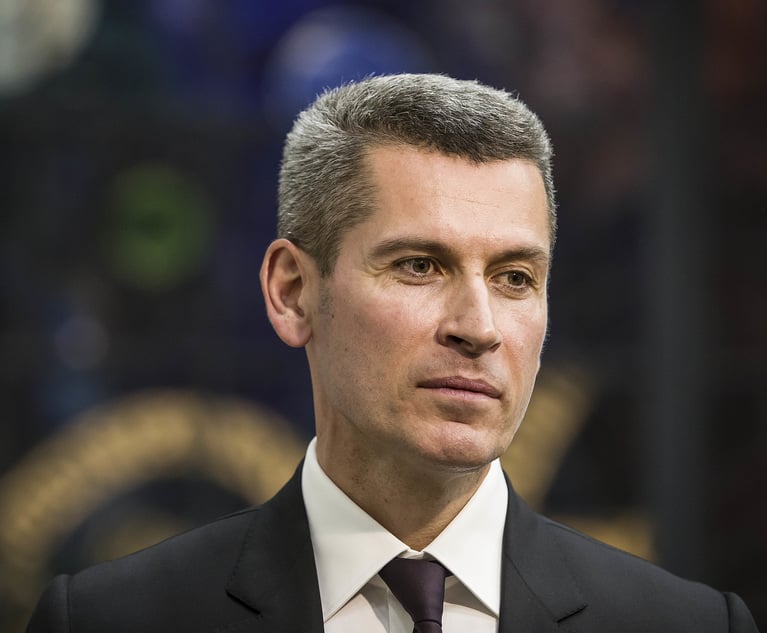WTO Members Set Up Temporary Trade Dispute Panel to Get Around US Veto
The EU, Canada, Brazil and China are among the 17 WTO members backing the plan.
January 24, 2020 at 02:59 PM
3 minute read
 Headquarters of the World Trade Organization in Geneva, Switzerland. Photo: Shutterstock.
Headquarters of the World Trade Organization in Geneva, Switzerland. Photo: Shutterstock.
The EU, China and 15 other members of the World Trade Organization today announced they are setting up a temporary dispute settlement body to resolve international trade conflicts.
The move comes in direct response to the undermining of the WTO's dispute body by the United States, which refused to appoint members of an arbitration panel.
"This statement testifies to the high importance that the EU and the participating WTO members attach to retaining a two-step dispute settlement process in WTO trade matters," said Phil Hogan, the European Commissioner for trade. "The multiparty appeal arbitration arrangement will guarantee that the participating WTO members continue to have access to a binding, impartial and high-quality dispute settlement system among them."
Hogan said that the new body was a "contingency measure."
"We will continue our efforts to seek a lasting solution to the Appellate Body impasse, including through necessary reforms and improvements," he said.
The 17 WTO members that have signed up the initiative are Australia, Brazil, Canada, China, Chile, Colombia, Costa Rica, the European Union, Guatemala, Republic of Korea, Mexico, New Zealand, Norway, Panama, Singapore, Switzerland and Uruguay.
The WTO's Appellate Body, which acts as a supreme court for international trade disputes among members of the Geneva, Switzerland-based body, has been paralyzed for more than two years. The Trump Administration refused to approve appointments to the arbitration body, and the terms for two of the body's three members came to an end in December. That left it unable to issue rulings.
The new body will remain in place until the vacancies on the Appellate Body are filled and it can resume normal operations.
The U.S.'s official reason for refusing to approve new appointments is that the Appellate body goes beyond its agreed-upon mandate. But the U.S. position is seen by other members as a way of undermining the multilateral trade dispute body in favor of bilateral deals.
Nic Lockhart, an international trade partner at Sidley Austin in Geneva, said the agreement to set up an interim body was "a very significant development" and a "rapid response to the U.S. blockade of the WTO appeals tribunal".
"It's a big vote of confidence in the WTO and multilateralism," he said.
Lockhart, who advised the Appellate Body for five years before joining Sidley, said that the involvement of a critical mass of WTO members made it likely that other members would join the group and that trade flows between these economies would continue to operate under WTO rules.
This content has been archived. It is available through our partners, LexisNexis® and Bloomberg Law.
To view this content, please continue to their sites.
Not a Lexis Subscriber?
Subscribe Now
Not a Bloomberg Law Subscriber?
Subscribe Now
NOT FOR REPRINT
© 2025 ALM Global, LLC, All Rights Reserved. Request academic re-use from www.copyright.com. All other uses, submit a request to [email protected]. For more information visit Asset & Logo Licensing.
You Might Like
View All

Jones Day, BCLP & Other Major Firms Boost European Teams with Key Partner Hires
4 minute read
$13.8 Billion Magomedov Claim Thrown Out by UK High Court
Trending Stories
- 1'A Death Sentence for TikTok'?: Litigators and Experts Weigh Impact of Potential Ban on Creators and Data Privacy
- 2Bribery Case Against Former Lt. Gov. Brian Benjamin Is Dropped
- 3‘Extremely Disturbing’: AI Firms Face Class Action by ‘Taskers’ Exposed to Traumatic Content
- 4State Appeals Court Revives BraunHagey Lawsuit Alleging $4.2M Unlawful Wire to China
- 5Invoking Trump, AG Bonta Reminds Lawyers of Duties to Noncitizens in Plea Dealing
Who Got The Work
J. Brugh Lower of Gibbons has entered an appearance for industrial equipment supplier Devco Corporation in a pending trademark infringement lawsuit. The suit, accusing the defendant of selling knock-off Graco products, was filed Dec. 18 in New Jersey District Court by Rivkin Radler on behalf of Graco Inc. and Graco Minnesota. The case, assigned to U.S. District Judge Zahid N. Quraishi, is 3:24-cv-11294, Graco Inc. et al v. Devco Corporation.
Who Got The Work
Rebecca Maller-Stein and Kent A. Yalowitz of Arnold & Porter Kaye Scholer have entered their appearances for Hanaco Venture Capital and its executives, Lior Prosor and David Frankel, in a pending securities lawsuit. The action, filed on Dec. 24 in New York Southern District Court by Zell, Aron & Co. on behalf of Goldeneye Advisors, accuses the defendants of negligently and fraudulently managing the plaintiff's $1 million investment. The case, assigned to U.S. District Judge Vernon S. Broderick, is 1:24-cv-09918, Goldeneye Advisors, LLC v. Hanaco Venture Capital, Ltd. et al.
Who Got The Work
Attorneys from A&O Shearman has stepped in as defense counsel for Toronto-Dominion Bank and other defendants in a pending securities class action. The suit, filed Dec. 11 in New York Southern District Court by Bleichmar Fonti & Auld, accuses the defendants of concealing the bank's 'pervasive' deficiencies in regards to its compliance with the Bank Secrecy Act and the quality of its anti-money laundering controls. The case, assigned to U.S. District Judge Arun Subramanian, is 1:24-cv-09445, Gonzalez v. The Toronto-Dominion Bank et al.
Who Got The Work
Crown Castle International, a Pennsylvania company providing shared communications infrastructure, has turned to Luke D. Wolf of Gordon Rees Scully Mansukhani to fend off a pending breach-of-contract lawsuit. The court action, filed Nov. 25 in Michigan Eastern District Court by Hooper Hathaway PC on behalf of The Town Residences LLC, accuses Crown Castle of failing to transfer approximately $30,000 in utility payments from T-Mobile in breach of a roof-top lease and assignment agreement. The case, assigned to U.S. District Judge Susan K. Declercq, is 2:24-cv-13131, The Town Residences LLC v. T-Mobile US, Inc. et al.
Who Got The Work
Wilfred P. Coronato and Daniel M. Schwartz of McCarter & English have stepped in as defense counsel to Electrolux Home Products Inc. in a pending product liability lawsuit. The court action, filed Nov. 26 in New York Eastern District Court by Poulos Lopiccolo PC and Nagel Rice LLP on behalf of David Stern, alleges that the defendant's refrigerators’ drawers and shelving repeatedly break and fall apart within months after purchase. The case, assigned to U.S. District Judge Joan M. Azrack, is 2:24-cv-08204, Stern v. Electrolux Home Products, Inc.
Featured Firms
Law Offices of Gary Martin Hays & Associates, P.C.
(470) 294-1674
Law Offices of Mark E. Salomone
(857) 444-6468
Smith & Hassler
(713) 739-1250









